"Little Miss Gloom and Doom"
Day Three of Being Boring's Araki Blogathon
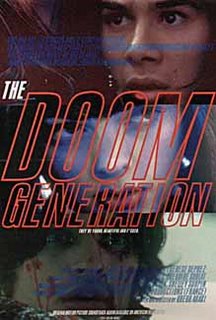 Gregg Araki's The Doom Generation has got to be one of the most misunderstood films ever made. Appearing on video store rental shelves in the mid 90's aside mediocre Z-list actor driven on-the-road-to-self-discovery straight to video movies, The Doom Generation presents through its thickly lacquered surface, an ambivalent revelry in gloom and doom destruction. Littered with nightmarish has-been cameos and set in a seemingly post-apocalyptic Los Angeles, its three morally defunct teenage protagonists go on a free wielding crime spree, blowing the heads, arms and dicks off of those who stand in their way. They're hardly portrayed as malevolent, however, and this is perhaps one of the many traits which has lead critics and audience's alike to view the film as a viscously fashionable exercise in masanthropy. As I've stated in previous pages, I too believed the film to be a lewd manifesto of MTV nihilism. Having seen the film more times than any rational person would care to admit, it is one which I can recite verbatim, in synch with its actors.
Gregg Araki's The Doom Generation has got to be one of the most misunderstood films ever made. Appearing on video store rental shelves in the mid 90's aside mediocre Z-list actor driven on-the-road-to-self-discovery straight to video movies, The Doom Generation presents through its thickly lacquered surface, an ambivalent revelry in gloom and doom destruction. Littered with nightmarish has-been cameos and set in a seemingly post-apocalyptic Los Angeles, its three morally defunct teenage protagonists go on a free wielding crime spree, blowing the heads, arms and dicks off of those who stand in their way. They're hardly portrayed as malevolent, however, and this is perhaps one of the many traits which has lead critics and audience's alike to view the film as a viscously fashionable exercise in masanthropy. As I've stated in previous pages, I too believed the film to be a lewd manifesto of MTV nihilism. Having seen the film more times than any rational person would care to admit, it is one which I can recite verbatim, in synch with its actors.
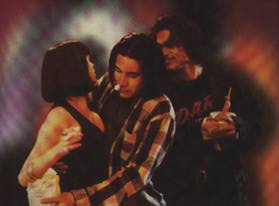 But how closely does one watch what they perceive to be a feature length angstily raucous music video? Sitting down this afternoon to regard the film a tad more closely, I was intensely surprised at my discovery. Now, I had since come to recognize the film as an indictment of those things I initially thought it to revel in. When Amy Blue (Rose McGowan) opens the film with "Fuck!" it's not in earnest, not an affront to all things decent. (Of course, on some level, it is this, but when approaching these films a little more generously, you'll find Araki never to be as simplistic as he seems) Instead it is a parodic anthem for a culture which, through the course of the film, Araki will examine with a suspectly scrutinous eye and eventually open up, causing this protagonist to come to a responsible realization of her misdirected subcultural indoctrination. She's lost her skull lighter. "I swear, if it's gone, I'll slit my wrists." He nelly boyfriend, Jordan White (James Duval) emerges from a hardcore slamdance floor and drapes his arm around her. "Yuck," she bitches, "you're all sweaty."
But how closely does one watch what they perceive to be a feature length angstily raucous music video? Sitting down this afternoon to regard the film a tad more closely, I was intensely surprised at my discovery. Now, I had since come to recognize the film as an indictment of those things I initially thought it to revel in. When Amy Blue (Rose McGowan) opens the film with "Fuck!" it's not in earnest, not an affront to all things decent. (Of course, on some level, it is this, but when approaching these films a little more generously, you'll find Araki never to be as simplistic as he seems) Instead it is a parodic anthem for a culture which, through the course of the film, Araki will examine with a suspectly scrutinous eye and eventually open up, causing this protagonist to come to a responsible realization of her misdirected subcultural indoctrination. She's lost her skull lighter. "I swear, if it's gone, I'll slit my wrists." He nelly boyfriend, Jordan White (James Duval) emerges from a hardcore slamdance floor and drapes his arm around her. "Yuck," she bitches, "you're all sweaty."
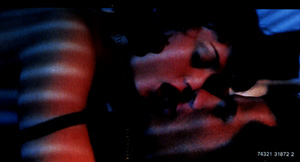 They go to "Heaven," an abandoned drive in movie theater where thugs lurk about in the background doing thugish things. We see their car shaking. They're fucking, or so we think. The Jesus head glued to the rear-view nods in bewilderment. But they're not fucking. Jordan's "afraid of catching AIDS." Enter Xavier(Jonathan Schaech) - thrown upon their windshield as a gang of goons(Skinny Puppy) fagbash him. They make a getaway, Xavier bleeding in the back seat. Insert narrative here.
They go to "Heaven," an abandoned drive in movie theater where thugs lurk about in the background doing thugish things. We see their car shaking. They're fucking, or so we think. The Jesus head glued to the rear-view nods in bewilderment. But they're not fucking. Jordan's "afraid of catching AIDS." Enter Xavier(Jonathan Schaech) - thrown upon their windshield as a gang of goons(Skinny Puppy) fagbash him. They make a getaway, Xavier bleeding in the back seat. Insert narrative here.
The Doom Generation's subtitle is "A Heterosexual Film by Gregg Araki." The film is, however, heterosexual in namesake only. Xavier, though it is never explicitly stated is "straight," sort of. He begins fucking Amy the first evening when awakes to find him straddling the bed upon which she and Jordan sleep. After having a brief discussion of the picture of Jesus he has tattooed on his dick, they escape to her car to consummate their sexual desires. And so proceeds the film. Having killed on Quickie Mart proprietor(whose wife is played by comedienne Margaret Cho), they sever their ties to that world of respectability which never truly embraced them in the first place, to instead aimlessly venture of the deserted freeways of a California here represented as industrial chic infringing upon Mad Max terrain.
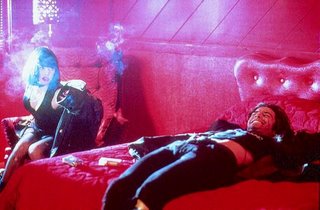 There is a surprisingly great deal of details contained within the film. The impeccable visual stylings (deserved applause to Michael Krantz and Jennifer M. Gentile) and horrific flashback cameos (we're talking regulars from 21 Jump Street, The Love Boat, Beverly Hills 90210, The Brady Bunch, V, Married... With Children, Ironside, a few porn stars, a Hollywood Madam, Perry Farrell and the inimitable Miss Parker Posey) are wonderfully orchestrated elements (not to mention the sensational soundtrack) but in many ways distract from the more poignant purposes which the film assumes. As our protagonists mope about listing off an endless dialogue of quotables, we begin to shift in our perception of them.
There is a surprisingly great deal of details contained within the film. The impeccable visual stylings (deserved applause to Michael Krantz and Jennifer M. Gentile) and horrific flashback cameos (we're talking regulars from 21 Jump Street, The Love Boat, Beverly Hills 90210, The Brady Bunch, V, Married... With Children, Ironside, a few porn stars, a Hollywood Madam, Perry Farrell and the inimitable Miss Parker Posey) are wonderfully orchestrated elements (not to mention the sensational soundtrack) but in many ways distract from the more poignant purposes which the film assumes. As our protagonists mope about listing off an endless dialogue of quotables, we begin to shift in our perception of them.
Xavier, who they have taken to calling X ("I'm not sure I can say all of that."), initially represents an ideal of outsiderness which Amy and Jordan so desperately wish to be a part. He's dangerous and edgy. He's the gay straight man - gay in a generation which does not embrace homosexuality, yet straight enough to pose as a romantic possibility for the oblivious Jordan (who's cluelessly heterosexual, in this narrative). He is pure id, at one point exclaiming, "guilt is for married, old people." He kills without remorse, never truly comprehending the consequences of his actions. Yet the story unfolds and as Amy begins to shift in fidelity towards this hubristic drifter, Jordan emerges as the true outsider - embodying a past, romantic ideal of subculture. In a sense, Jordan is the embodiment of Araki's previous cinematic endeavors; The Doom Generation serving as both farewell to the old (the ideals of Araki's prior works and New Queer Cinema, at large) and a ringing in of the new. (Araki's critical embrace of the more MTV styled aesthetic and of generations removed from his own, those which do not whole-heartedly embrace Queerness as a subversive act, but as a weakness which should be repressed - hence, "A Heterosexual Film" by a homosexual filmmaker.)
 The film is, despite my prior assumptions and that import placed on Queerness, in fact, Amy's story. (Perhaps a more apt subtitle might have been "A Women's Film by Gregg Araki.) Hers is the character who throughout the film's proceedings proves the greatest level of dynamism, changing her personal perspective from start to finish. She is seduced by this nihilistically callous drifter, idealizes the counterculture she so desperately clings to: kill tattooed on her fingers, the skull lighter, morbid paraphernalia covering every empty inch of her car. In one scene, she hold the boxset for the atmospheric goth band This Mortal Coil and claims, "I wish I could just crawl in here and disappear forever." When her past sexual proclivities come back to haunt her, first she shrugs them off in denial. Yet, at the end of the film, when Amy meets the death and destruction which fashion would have her appreciate, she finally assumes a (albeit violent) sort of responsibility as she horrifically murders the gang of Nazi skinheads who have cut short Jordan's life. They say, as they are about to deliver the fatal blow, "you're going to watch me help your fairy boy toy shuffle off this mortal coil." The multitude of ironies here begin with Jordan's misrecognition as a homosexual and ends with that phrase which to Amy's connotes bliss being brought into its true context. The morbid languishness of This Mortal Coil makes depression and death an appealing and fashionable, yet brought into a real context, her affectations and desires not only haunt her, but bring about the death of that person most dear to her. She slays the Nazi's with that same implement which robbed her idyllic lover of his life and assumes a more active and understanding role in culture at large, and denies the escapist comfort of an abstracted counter culture ruled by commodified fads.
The film is, despite my prior assumptions and that import placed on Queerness, in fact, Amy's story. (Perhaps a more apt subtitle might have been "A Women's Film by Gregg Araki.) Hers is the character who throughout the film's proceedings proves the greatest level of dynamism, changing her personal perspective from start to finish. She is seduced by this nihilistically callous drifter, idealizes the counterculture she so desperately clings to: kill tattooed on her fingers, the skull lighter, morbid paraphernalia covering every empty inch of her car. In one scene, she hold the boxset for the atmospheric goth band This Mortal Coil and claims, "I wish I could just crawl in here and disappear forever." When her past sexual proclivities come back to haunt her, first she shrugs them off in denial. Yet, at the end of the film, when Amy meets the death and destruction which fashion would have her appreciate, she finally assumes a (albeit violent) sort of responsibility as she horrifically murders the gang of Nazi skinheads who have cut short Jordan's life. They say, as they are about to deliver the fatal blow, "you're going to watch me help your fairy boy toy shuffle off this mortal coil." The multitude of ironies here begin with Jordan's misrecognition as a homosexual and ends with that phrase which to Amy's connotes bliss being brought into its true context. The morbid languishness of This Mortal Coil makes depression and death an appealing and fashionable, yet brought into a real context, her affectations and desires not only haunt her, but bring about the death of that person most dear to her. She slays the Nazi's with that same implement which robbed her idyllic lover of his life and assumes a more active and understanding role in culture at large, and denies the escapist comfort of an abstracted counter culture ruled by commodified fads.
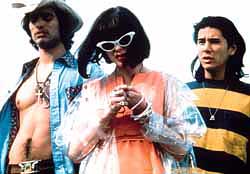 In the alarmingly redemptative final sequence, the irony free remaining duo drive silently. A cigarette, whose pack we have noticed throughout the film to be adorned with a skull and cross bones, dangles from her lips. Xavier brings the skull lighter, which was found a few scenes prior, to the cig and ignites the flame. Amy regards the lighter, its morbid casualness. We recognize that it no longer amuses her as she hesitantly brings the tip of her cigarette to the flame. An unchanged Xavier opens a bag of chips. "You want a Dorito." Cut to an exterior shot of the car, the roof of which we see, for the first time, is tagged with a smiley face. Assuredly in its creation, this icon was meant as an ironic gesture, but now, not only does it have a more ominous feel, but conversely it allows us a little hope. Perhaps this assumption of responsibility, a coming of age, as it were, will allow for some integrity, however horribly it has been reached. And, as it reads in the film's shooting script, "The ROARING WHOOSH of the Torino suddenly passing by is followed by the car slowly, inevitably receding, becoming tiny and dotlike, a greenish-blue speck under the immense, sprawling horizon. Its total insignificance in the vast, indifferent scheme of things is heartrendingly apparent. slow final fade to BLACK"
In the alarmingly redemptative final sequence, the irony free remaining duo drive silently. A cigarette, whose pack we have noticed throughout the film to be adorned with a skull and cross bones, dangles from her lips. Xavier brings the skull lighter, which was found a few scenes prior, to the cig and ignites the flame. Amy regards the lighter, its morbid casualness. We recognize that it no longer amuses her as she hesitantly brings the tip of her cigarette to the flame. An unchanged Xavier opens a bag of chips. "You want a Dorito." Cut to an exterior shot of the car, the roof of which we see, for the first time, is tagged with a smiley face. Assuredly in its creation, this icon was meant as an ironic gesture, but now, not only does it have a more ominous feel, but conversely it allows us a little hope. Perhaps this assumption of responsibility, a coming of age, as it were, will allow for some integrity, however horribly it has been reached. And, as it reads in the film's shooting script, "The ROARING WHOOSH of the Torino suddenly passing by is followed by the car slowly, inevitably receding, becoming tiny and dotlike, a greenish-blue speck under the immense, sprawling horizon. Its total insignificance in the vast, indifferent scheme of things is heartrendingly apparent. slow final fade to BLACK"

2 Comments:
Great post, I wrote about the film on my blog after I saw it. I'd agree that it's a really misunderstood film, it's easy to get lost in the surface, but there's so much going on here.
Side note, do you know of anywhere to get a widescreen DVD of the film? It's very elusive.
I believe that the Australian DVD of the film is widescreen, if you feel like plopping down the $25 + shipping
Post a Comment
<< Home